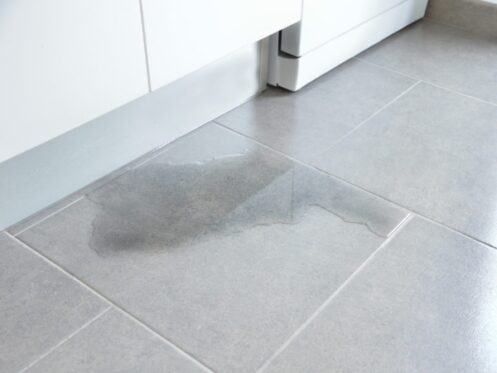The plumbing system in your Lincoln, Nebraska, home is subject to building codes that ensure its safety, performance, and efficiency. The design of this system and the different components that it’s compromised of have been rigorously tested with the goal of preventing leaks and other common issues. Problems can still occur, however. Fortunately, you can proactively stave leaks off and save thousands of dollars in the process.
Understanding the Widespread Effects of Water Leaks
If caught and corrected early on, water leaks and the damage that they cause can be contained in fairly small areas. At their worst, minor leaks might damage your flooring, baseboards, drywall, and other surrounding structural elements, but they’re unlikely to impact multiple levels of your home, your indoor air quality, or your health.
Unfortunately, some of the most problematic plumbing leaks aren’t massive, and they don’t involve a sudden influx of water. Instead, these are slow and hidden leaks that are located behind drywall or at inconspicuous plumbing connections. For instance, you might have a small, slow leak behind your dishwasher or washing machine, or you may have a leak from the water connection for your refrigerator’s ice maker.
If you spot a small pool of water in front of your refrigerator door, it’s easy to assume that someone has either spilled their beverage or dropped an ice cube. It could be days or even weeks before you discover that the appliance is continuously leaking instead. In the meantime, the floor and underlying sub-floor, the nearby baseboards, and even the refrigerator itself are constantly sustaining new damage.
There’s also the fact that water leaks create the ideal conditions for mold and mildew development. After a flood, water damage clean-up should be implemented right away because mold spores take just 24 to 48 hours to form. With water leaks, this same risk exists, but if a leak is hidden, water damage restoration might not start for quite some time. This could mean seeing a tremendous decrease in your indoor air quality (IAQ) along with adverse changes in resident health.
Unfortunately, unchecked leaks can also set the stage for serious pest problems. Even if you’re diligent about covering your trash and keeping your food supplies well-sealed, rodents, insects that thrive in the local environment, and other unwanted guests will still come into your home if there’s a source of potable water. If you’ve been struggling with ants, cockroaches, mosquitoes, rats, or mice, finding and fixing water leaks could be an essential part of your pest treatment plan.
Between building damages, mold problems, and pest troubles, even a single leak can cost thousands of dollars overall. When you have a strategic and multi-pronged leak prevention plan in place, you can save a veritable fortune over time.
The Price of Prevention vs. the Cost of Repairs
Many of the most effective forms of leak prevention are actually measures that you should already be taking. For instance, scheduling a whole-house plumbing inspection each year is a great way to ensure that slow and hidden leaks don’t go undetected for long. Moreover, annual plumbing inspections are also essential for maintaining compliance with home insurance plans and the terms of home service agreements.
Dealing with a leak is about far more than simply wiping water up and fixing the leak’s source. Whenever there’s a significant leak or flood in the home, multiple forms of equipment must be used to ensure that all moisture is extracted. After you’ve mopped or suctioned excess water up, there will still be moisture that’s trapped within the air pockets of building materials. This is why water damage restoration companies use heaters, air movers, fans, and more. They also apply sanitizing and deodorizing agents to block mold spore development and eliminate foul smells. The costs of these efforts alone can far exceed the costs of having a whole-house plumbing inspection performed each year.
Another great form of leak prevention is always hiring plumbing professionals. It’s easy to get caught up in the current do-it-yourself craze by purchasing supplies at a local home and hardware store and following along with online instructional videos. However, plumbers always perform their work according to the rigorous standards set by local building codes. Their work is properly permitted, assured to withstand the tests of time, and capable of preserving the value, marketability, and integrity of both your plumbing system and your home.
Resident Health Issues Caused by Leaks
When comparing the costs of leak mitigation to the costs of leak prevention, it’s also important to account for the potential impact of plumbing leaks on human health. Not all leaks result in the spread of clean, potable water. Sometimes, leaks expose homeowners to gray water from shower pans and bathroom sinks that’s rife with chemical and biological contaminants.
In other instances, leaks, blockages, and backups expose homeowners to harmful black water that’s filled with potentially deadly pathogens. Even potable water can contain a fair amount of harmful germs when it’s pooling, stagnant, and smelly. From tummy troubles to breathing ailments, unchecked plumbing problems can undermine the health of everyone in your home. Moreover, the costs of resolving these issues can be just as high as the costs of resolving structural building damage.
The Elements of Leak Prevention
In addition to scheduling whole-house plumbing inspections and making sure that all aspects of your plumbing system are installed, maintained, and repaired by licensed professionals, you can:
- Insulate exposed pipes to prevent freezing and ruptures
- Have proactive leak detection technologies installed
- Be ready with leak barriers to reduce the spread of leaks
- Replace water-reliant appliances at or just before the end of their lifespans
- Locate the stopcock for your water supply
Old age, corrosion, and rust are common causes of pipe leaks. Thus, it also pays to have aging pipes replaced before they fail outright. If you have excessively hard water in your home, you should have your water tested and consider having a water softener installed. This will prevent mineral buildups and excess stress at the interior of your pipes and prevent cracks and other forms of egress.
Consider tree roots and shifting soils outside of your home. Leaks and the high costs of resolving them aren’t just a concern at the building interior. Unchecked water leaks outdoors caused by tree root blockages often go hand-in-hand with whole-house back-ups, foundation damage, and other expensive problems.
How Leak Detection Technologies Help
With the ongoing potential for developing slow and hidden leaks, annual plumbing inspections still leave you with lots of time for problems to arise. Leak detection technologies sense increases in moisture and notify homeowners before damages have the opportunity to become widespread.
Leak detection plans can include flood sensors paired with room alert monitors or digital humidity sensors. If you’re interested in leak detection, we can help you arrive at the perfect combination of tools for your home and its unique risk factors.
For more than 20 years, John Henry's Plumbing, Heating, Air, and Electrical has been proudly serving residents of Lincoln, NE, and the surrounding area. We offer heating, cooling, plumbing, and drain cleaning services. We also provide duct cleaning and UV air sanitization. To find out more about leak prevention or to get a customized leak prevention plan, give John Henry's Plumbing, Heating, Air, and Electrical a call today.

